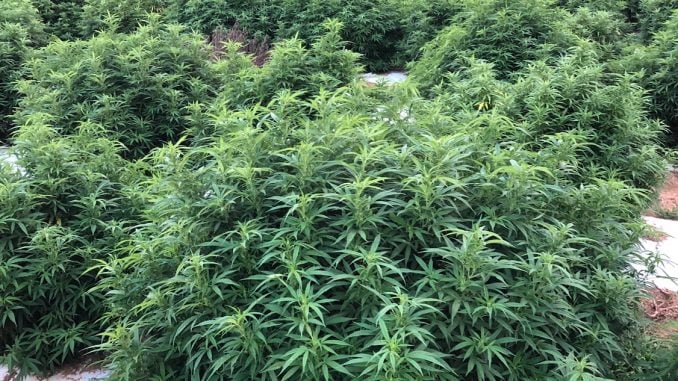
ASHBORO — The textile industry in North Carolina is seeing a boost from a newly-formed partnership in Randolph County involving CBD oil-infused fabrics.
Founder’s Hemp is teaming up with Nufabrx, a biomaterials technology company, to make fabrics infused with CBD oil, an extract from the Hemp plant. The partnership evolved with help from the Randolph County Economic Development Corporation and includes an agreement to work with Bossong Hosiery.
William Franklin, president of the Randolph County Economic Development Corporation (RCEDC), said that while his organization did not broker the alliance, they helped Founder’s Hemp to recently obtain a grant to renovate a building to create additional cleanroom space for enhancing their extraction capacity.
“It’s an exciting thing for us in economic development, to see agriculture, which has been a pretty significant part of our local economy for many generations, tied together with textiles, which has also been significant in our local economy for generations,” said Franklin.
According to NuFabrx, their fabric is a patented, proprietary biomaterial technology that embeds “active ingredients into fabrics” and can be programmed to respond to the body for “predictable, effective, and long-lasting dermal release.” The company says they are “committed to manufacturing domestically.”
Over the past three years, Founder’s Hemp and Nufabrx have been testing and developing a compression sleeve garment, called Hemp Squeeze, to deliver pain relief treatment to the elbow and knee. The garment uses CBD Oil from Founder’s Hemp infused into the fabric of the Nufabrx yarn.
CBD oil and CBD products have become a multibillion-dollar industry in the last few years and Hemp is expected to become a modern cash crop if embraced in states like North Carolina.
Cannabidiol, usually referred to as CBD, comes from the cannabis plant. CBD does not produce a high like tetrahydrocannabinol (THC) does in marijuana and isn’t considered a mind-altering substance. For some people, CBD has been found to alleviate insomnia, arthritis, nerve pain, depression and even epilepsy.
CBD effects are felt through cannabinoid receptors throughout the body which can control sleep, feelings of pain and hunger. There are two types of receptors, CB1, which plays a part in moods, motor coordination, sleep regulation and hunger, and CB2, which can lessen inflammation or swelling.
While the pairing of agriculture with fabrics will benefit both industries, the partnership has the possibility of breathing some life into a nearly-dead textile industry in North Carolina.
“It’s just coming to market,” said Franklin. “No one has any sales to show yet but it’s just such an exciting collaboration and innovation with a couple of legacy industries — agriculture and textile industries — here in Randolph County.”
The textile industry’s nationwide decline began decades ago in the mid-1970’s. Between 1975 and 1985, an estimated 800 textile mills shut down across the country. In North Carolina, textile mill employment fell dramatically, with over 82,000 lost between 1973 and 1986.
After the passage of the North American Free Trade Agreement in 1994, the decline continued.
By the 2000s, textile facilities in North Carolina, South Carolina and northern Georgia continued to see heavy losses as products from overseas were often cheaper for consumers and companies struggled with rising costs and labor union demands.
In response, many domestic textile companies either shut down or moved jobs out of the country in an attempt to stay afloat.
The Tarheel state, which had been a leader in the textile industry since the late 1890s, lost around 100,000 textile jobs between 1997 to 2002.
Burlington Industries, which in the late 80s had employed a staggering 43,000 people, found their employment ranks slashed down to around 11,000 in 2002. Randolph County was hit particularly hard with a 43% decline in textile jobs between 2010 and 2018.


